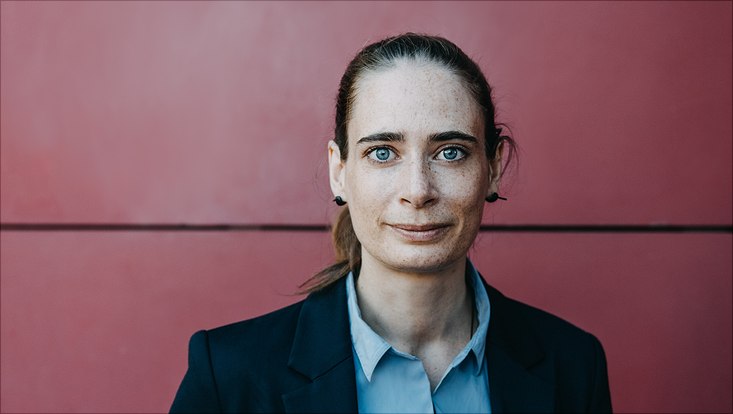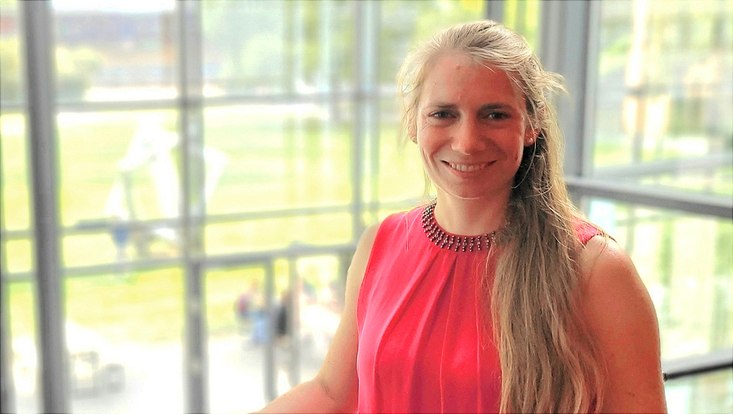“Welcome Aboard!”“We need effective, inclusive, fair, and sustainable AI technologies.”Prof. Dr. Anne Lauscher strengthens business administration
28 September 2022, by Lauscher/Red.

Photo: Sarah Buth
Every year, Universität Hamburg welcomes numerous new researchers. This series introduces them and their areas of research.
Prof. Dr. Anne Lauscher is joining the Faculty of Business Administration (Hamburg Business School) in winter semester as Professor of Data Science in Business Administration/Informatics. Previously, she was at Università Commerciale Luigi Bocconi in Milan, Italy.
My research area in 3 sentences:
In the field of data science, I research artificial intelligence (AI) that is able to understand and generate natural language texts (epsecially with a focus on conversation and argumentation). It’s important here for AI in a classic sense to function well, meaning that it can solve the problem posed to it; it should also, however, do justice to ethical concerns. For example, does AI have racist or sexist tendencies or can we shape AI models with greater energy efficiency?
I explain what I do to my friends and family as follows:
The question is “How can we and how do we want to shape communication in the future?”
In Hamburg, the city and the University, I am looking forward to:
Hamburg is well-known as the “pearl of the north,” and there is so much to discover! So I am looking forward to the city’s variety of cultural opportunities, for example, at the Hamburger Kunsthalle and the Elbphilharmonie. I am also a big foodie, and Hamburg can also be proud of itself in this area—let me just say: Franzbrötchen (note: a Hamburg delicacy similar to a cinnamon bun). Of course, I am especially excited about the University, which, as one of Germany’s universities of excellence and the largest university in northern Germany is especially diverse and inspiring.
These are my plans at Universität Hamburg:
At Universität Hamburg, I will advance basic research in the area of automatized communication. To do so, I will build a strong research group that focuses as holistically as possible on AI processing of natural language. I am also convinced that it takes collaboration and multiple perspectives to shape automatized communication usefully for society. For this, I will be collaborating with researchers from various disciplines and faculties.
This is why students should come to my lectures:
Data science methods are the basis of modern AI systems. That is not only incredibly exciting, it is also becoming a part of all areas of life. For example, I am certain that the majority of students at Universität Hamburg have interacted at some point with a personal voice assistant (e.g., via a smartphone). Today, these kinds of systems are usually based on machine learning methods for the automated processing of language and text. Thus, I can only recommend that everybody considers these topics at some point.
Reaching out to the world: I work with the following international and federal institutions and universities:
In the last 5 years, I have collaborated with about 60 other researchers from universities, industry, and other research institutions. They include, for example, members of the University of Cambridge, New York University, Carnegie Mellon University, the University of Michigan, Grammarly Inc., and, above, the Allen Institute for Artificial Intelligence in Seattle.
My research is important to society, to help resolve the following issues:
In Germany, Europe, and many other regions of the world, AI is seen as a key technology. Our society believes in AI and that AI will transform our society. It’s exciting to discover new areas in which AI can create added societal value: can chat bots moderate political debates to ensure plurality? Here, in my opinion, it is vital to shape these systems so that they truly have social value and do not just replicate hegemonic and conservative viewpoints or, though they may be fair and functional, their high use of energy damages the climate. This is why I research not only effective but also inclusive, fair, and sustainable AI technologies.
Open-Topic-Professorship
As part of the Excellence Strategy of the Federal and State Governments, Universität Hamburg—University of Excellence will appoint three open-topic professorships. The newly appointed professors are intended to help turn profile initiatives into emerging fields. Nicolas Schuck takes up one of these open-topic professorships. The professorship is based in the profile initiative Mechanisms of Change.


